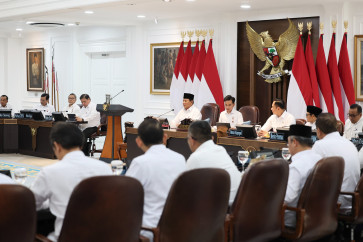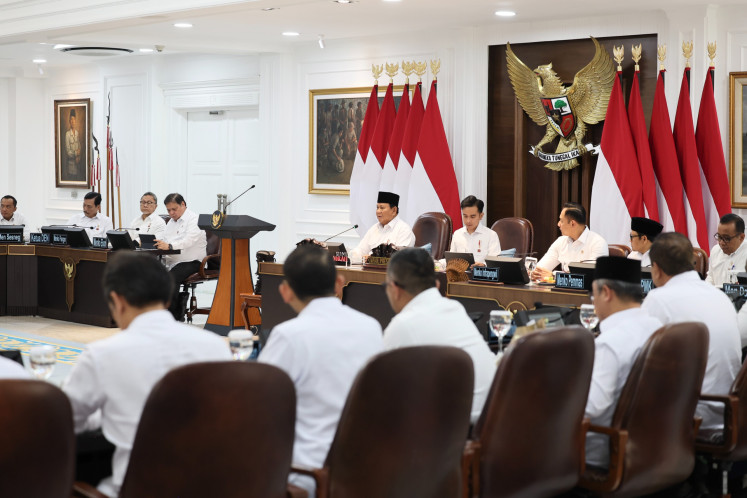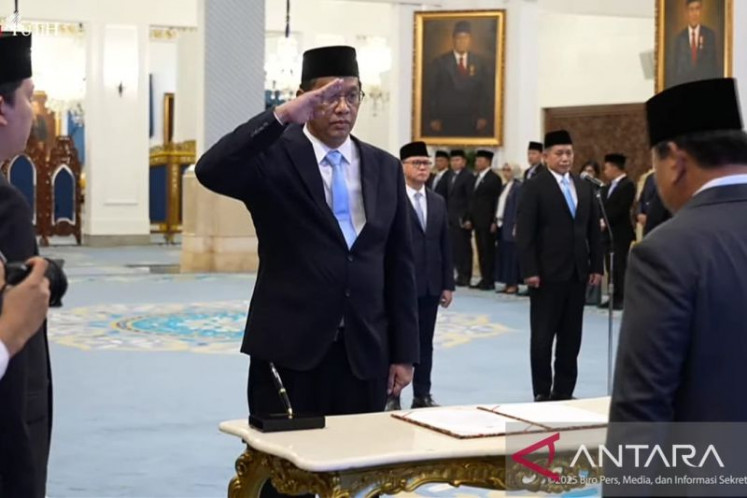Popular Reads
Top Results
Can't find what you're looking for?
View all search resultsPopular Reads
Top Results
Can't find what you're looking for?
View all search resultsEmpowerment or privilege? Minister Bintang’s challenge
I Gusti Ayu Bintang Darmawati has joined President Joko “Jokowi” Widodo’s new Cabinet
Change text size
Gift Premium Articles
to Anyone
I
Gusti Ayu Bintang Darmawati has joined President Joko “Jokowi” Widodo’s new Cabinet. Known primarily as the wife of a former cooperatives minister, she will face many challenges as the new women’s empowerment and child protection minister. Her Balinese background illustrates, in part, the challenges many Indonesian women face in custom-bound communities.
Balinese society is deeply influenced by patriarchy, marginalizing women in family and community affairs. Traditionally, women are not involved in decision-making nor entitled to an inheritance, and they are vulnerable in cases of marriage and divorce.
Contemporary Balinese women have a threefold burden. First, they bear the responsibility for reproduction. Second, as tourism has forced up living costs, many women must seek extra income for their families. Finally, Balinese women must maintain cosmic harmony through complex ritual offerings during daily, half-yearly and annual religious cycles.
The weight of these burdens may differ among women depending on their social class and position within the Balinese caste system. Bintang was born into a noble family within the ksatrya caste and is married to Anak Agung Puspayoga, a noble from Puri Satrya (Satrya Palace) in Denpasar, Bali’s capital. He was the cooperatives minister during President Jokowi’s first term.
In this privileged position, she may not have experienced the difficulties of an ordinary Balinese working-class woman. It is, therefore, vital for her to cultivate a sensibility to the problems of women at the bottom of society — mainly marginalization.
Known as Bintang Puspayoga in Bali, her name is tied to her husband’s social stature and family. Her father-in-law was a prominent figure in the provincial branch of the ruling party, the Indonesian Democratic Party of Struggle (PDI-P), with close ties since the 1980s to its chairwoman, Megawati Soekarnoputri. This is the political connection that situates the Satrya Palace at the center of local party power.
Therefore palace members have access to political positions on the island. Puspayoga, Bintang’s husband, for instance, was Denpasar’s mayor and Bali’s deputy governor before becoming minister. Bintang’s brother, I Gusti Ngurah Jaya Negara, also from the PDI-P, was recently Denpasar’s deputy mayor.
Without a visible track record of contributing to women’s empowerment or child protection at the provincial or national level, Bintang is regarded so far as the beneficiary of her husband’s connections to the ruling party.
If she does not make a quick effort to prove otherwise, the irony will remain — that a minister charged with empowering Indonesian women holds power only in the shadow of her husband and his network. Without action to the contrary, her stature will only continue to remind people of widely criticized dynastic politics at both the national and regional level.
To undertake policies and programs for women’s empowerment and children’s protection, the minister can take a leaf from the scholar N. Kabeer who cites three dimensions of empowerment: resources, agency and achievement.
Resources are not only material but also legal and institutional. They can be mobilized for making future claims. Agency refers to the capacity to define one’s life choices and to pursue goals by making decisions that affect one’s own interests. Achievement is a state of agency reached by women through mobilizing their available resources.
The women’s rights movement is currently pushing to pass the sexual violence eradication bill. The government’s final draft was improved by Bintang’s predecessor, Yohana S. Yembise. This law is urgently needed to dismantle the power asymmetry between women and men, which leads to violence against women.
Many studies have found that societies with more equal gender relations have a lower incidence of gender-based violence. Despite opposing parties, including Islamic political parties, Minister Bintang has wide support to pass the bill into law.
Minister Bintang first needs to prove that she can escape from the shadow of her husband and his family. This will be important before she attempts to empower sisters across Indonesia.










